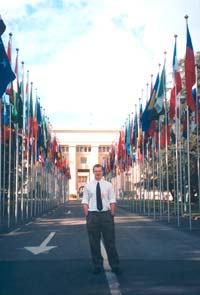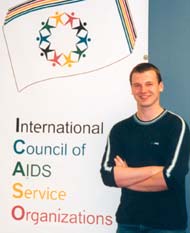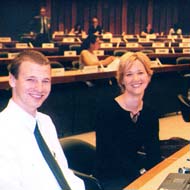International Council of AIDS Service Organizations (ICASO), Toronto, and the UN Office of the High Commissioner for Human Rights (OHCHR), Geneva, Switzerland
 My 2003 International Human Rights Program Summer Internship consisted of 8 weeks spent at the International Council of AIDS Service Organizations (ICASO) in Toronto, followed by 8 weeks spent at the UN Office of the High Commissioner for Human Rights (OHCHR) in Geneva, Switzerland. In both placements, my work focused mainly on HIV/AIDS and human rights issues. My experiences, which are described below, were both enriching and rewarding. I felt that I was able to significantly contribute to the work of both organizations while also learning a great deal about international human rights work and advocacy, especially with respect to the HIV/AIDS epidemic. Splitting the summer between these two organizations had the added benefit of exposing me to both the civil society as well as the international organizational responses to international human rights concerns.
My 2003 International Human Rights Program Summer Internship consisted of 8 weeks spent at the International Council of AIDS Service Organizations (ICASO) in Toronto, followed by 8 weeks spent at the UN Office of the High Commissioner for Human Rights (OHCHR) in Geneva, Switzerland. In both placements, my work focused mainly on HIV/AIDS and human rights issues. My experiences, which are described below, were both enriching and rewarding. I felt that I was able to significantly contribute to the work of both organizations while also learning a great deal about international human rights work and advocacy, especially with respect to the HIV/AIDS epidemic. Splitting the summer between these two organizations had the added benefit of exposing me to both the civil society as well as the international organizational responses to international human rights concerns.
The main focus of my work project at ICASO was to develop a means to monitor and evaluate implementation of the Declaration of Commitment adopted by Member States at UN General Assembly Special Session on HIV/AIDS (UNGASS). Amongst other things, at the heart of this Declaration is the protection and promotion of human rights in the context of HIV/AIDS, including the rights of people living with HIV/AIDS (PLHAs) and groups most vulnerable to infection.
As part of their commitments at UNGASS, Member States pledged to submit to the Secretary General (through UNAIDS) yearly reports on progress made by them in implementing the Declaration of Commitment. This process culminates in a yearly Secretary General report being submitted to the UN General Assembly for consideration. For this purpose, UNAIDS has developed a standard set of progress indicators. Member Governments are asked to submit appropriate data for use in calculating indicator measurements as part of their annual UNGASS reports. Theoretically, these indicators serve as benchmarks of a country's compliance with its UNGASS commitments. However, they have been highly criticized for their high dependence on sophisticated data collection and analysis and for their lack of transparency. This effectively prevents civil society organizations from being able to 'shadow' government reports, thus allowing governments to make claims of compliance that cannot be substantiated.
 ICASO has undertaken a project to independently monitor States' compliance with the UNGASS Declaration of Commitment, which aims to use progress indicators that are transparent and that use data which can be collected without the resources of a Government agency. This project will initially be piloted in four countries: The Philippines, Kenya, Venezuela and The Ukraine, and will be rolled out on a larger scale should the methodology prove successful. UNAIDS has shown a willingness to include information from such a 'shadow' monitoring project in future Secretary General reports on Declaration of Commitment compliance. In order to do this, a more efficient and feasible method of data collection and set of compliance indicators were needed.
ICASO has undertaken a project to independently monitor States' compliance with the UNGASS Declaration of Commitment, which aims to use progress indicators that are transparent and that use data which can be collected without the resources of a Government agency. This project will initially be piloted in four countries: The Philippines, Kenya, Venezuela and The Ukraine, and will be rolled out on a larger scale should the methodology prove successful. UNAIDS has shown a willingness to include information from such a 'shadow' monitoring project in future Secretary General reports on Declaration of Commitment compliance. In order to do this, a more efficient and feasible method of data collection and set of compliance indicators were needed.
My role on this project was to develop this set of indicators, method of data collection, and a detailed in-country study plan. Among other things, this process involved researching methods of human rights monitoring, particularly in the realm of economic, social and cultural rights. In opposition to civil and political rights, compliance with these rights proves particularly difficult to measure given their nature as positive obligations on States. For example, it is much more difficult to analyze whether a certain level of inaction on the part of a State amounts to a breach of a positive duty, than to document an instance of torture or of denial of due process of law (which are breaches of civil and political rights or so-called 'negative' rights).
Nevertheless, through recourse to texts and projects by academics, NGOs and UN agencies, as well as through collaboration with and input from ICASO's regional networks, human rights experts, and UNAIDS, a specific study plan aimed at monitoring compliance with UNGASS commitments (many of which are in their nature positive human rights obligations) was developed. The text of this document lays out a substantial study methodology, including interviews to conduct (with questionnaires for use in interviewing), legislative and policy documents to analyze, and relevant observational data to collect. A compilation of this information and comparison between countries forms the foundation of indicators of Declaration of Commitment compliance.
Currently, research is being carried out in the four pilot countries listed above using my study plan and indicators. This phase will be completed by spring of 2004 and a final report will be completed in time for circulation at the UN General Assembly in September of 2004. If successful, it is hoped that more funding will be obtained to carry out this study on a broader scale and for inclusion in future Secretary General reports.
In addition to this project, the small size of ICASO's central office in Toronto allowed me to participate actively in other facets of the organization. I regularly attended meetings on other HIV/AIDS issues, I participated in their organizational planning sessions, and I met with representatives from the Global Fund to Fight AIDS, TB and Malaria, etc. This gave me significant insight into the operation of international NGOs and allowed me to broaden my knowledge of HIV/AIDS issues. I also feel very satisfied with the level of contribution I was able to make to ICASO's UNGASS monitoring project, which has the potential to be very important advocacy work for holding Governments accountable to their commitments to fight the global HIV/AIDS epidemic. My co-workers and supervisor were extremely supportive and also very dedicated to ICASO's cause. I am sure that my collaboration with this organization will continue beyond this internship. In fact, I plan to be involved with future work on their UNGASS monitoring project and hope to further strengthen ties between the International Human Rights Program at the University of Toronto and ICASO.
 My internship with OHCHR in Geneva proved equally engaging and satisfying. Within OHCHR's organizational structure, I was placed with the Human Rights in Development Unit of the Research and Policy Branch. The team that I worked with focused specifically on work related to HIV/AIDS and human rights. My main responsibility was to develop OHCHR's website on HIV/AIDS. This work involved extensive research and writing on the overall link between HIV/AIDS and human rights, on specific issues (totaling 38) where human rights and HIV/AIDS issues intersect (including women's rights, access to medicine, orphans, migration, freedom of expression, right to health, education, etc.), and on the work of OHCHR to address HIV/AIDS and human rights concerns worldwide. Further work on the website included compiling all UN documents, reports and resolutions relating to HIV/AIDS and human rights, creating links to other UN agency and NGO websites addressing HIV/AIDS issues, and designing the overall appearance and structure of the website.
My internship with OHCHR in Geneva proved equally engaging and satisfying. Within OHCHR's organizational structure, I was placed with the Human Rights in Development Unit of the Research and Policy Branch. The team that I worked with focused specifically on work related to HIV/AIDS and human rights. My main responsibility was to develop OHCHR's website on HIV/AIDS. This work involved extensive research and writing on the overall link between HIV/AIDS and human rights, on specific issues (totaling 38) where human rights and HIV/AIDS issues intersect (including women's rights, access to medicine, orphans, migration, freedom of expression, right to health, education, etc.), and on the work of OHCHR to address HIV/AIDS and human rights concerns worldwide. Further work on the website included compiling all UN documents, reports and resolutions relating to HIV/AIDS and human rights, creating links to other UN agency and NGO websites addressing HIV/AIDS issues, and designing the overall appearance and structure of the website.
 In addition to working on the website, I partook in following up Human Rights Commission resolutions related to HIV/AIDS. This involved drafting letters and Notes Verbales to State Permanent Missions in Geneva, International Organizations and NGOs requesting information on measures they have taken to implement the provisions of these Commission resolutions. I also had the opportunity to review a publication on HIV prevention in emergency settings, to participate in a meeting of Special Rapporteurs co-sponsored by UNAIDS and OHCHR examining links between Special Rapporteur mandates and HIV/AIDS issues, and to attend a variety of other meetings with UNAIDS, OHCHR and WHO officials working on HIV/AIDS and human rights.
In addition to working on the website, I partook in following up Human Rights Commission resolutions related to HIV/AIDS. This involved drafting letters and Notes Verbales to State Permanent Missions in Geneva, International Organizations and NGOs requesting information on measures they have taken to implement the provisions of these Commission resolutions. I also had the opportunity to review a publication on HIV prevention in emergency settings, to participate in a meeting of Special Rapporteurs co-sponsored by UNAIDS and OHCHR examining links between Special Rapporteur mandates and HIV/AIDS issues, and to attend a variety of other meetings with UNAIDS, OHCHR and WHO officials working on HIV/AIDS and human rights.
Furthermore, I acted as an assistant to the Secretary of the Working Group on the Administration of Justice during the 2003 Sub-commission on the Promotion and Protection of Human Rights. This work involved note-taking during Working Group sessions as well as helping in the preparation of the final report of the Working Group, which can be found online at OHCHR's website. I was also privileged to attend various presentations and events for interns at OHCHR and to attend sessions of the Human Rights Committee.
Overall, I found the work experience to be excellent. I am very satisfied with my contribution to OHCHR as it is likely that the website I developed will serve as a source of information to people all over the world seeking to learn about the connection between international human rights law and HIV/AIDS. Additionally, my supervisor was extremely helpful, responsive and always asked for my input on decisions. I was pleasantly surprised about this considering the large size of UN organizations, and the extremely busy schedules of staff members. Though the level of responsibility delegated to me was less than that at ICASO, the opportunity to learn first hand about the UN, and specifically about international human rights mechanisms and machinery, certainly made up for it. An added benefit of this internship was the opportunity to meet other interns from all corners of the globe. This turned out to be an amazing opportunity to learn about other cultures and to enjoy the company of interesting people in a beautiful and truly cosmopolitan city. Geneva is certainly a great place to be in the summer!
On a sour note, I was also present at OHCHR when the High Commissioner for Human Rights was killed in Iraq by the bombing at the UN headquarters. This was an extremely somber experience and demonstrated to me the potential danger that one faces in the struggle to promote and protect human rights worldwide.
In conclusion, I believe that both internships struck the appropriate balance between contribution and learning experience. Both of these elements are essential to a successful internship experience. ICASO and OHCHR came away satisfied with the work I was able to achieve and I came away having learned a lot of practical knowledge and having made a range of great contacts for my future career.

 My 2003 International Human Rights Program Summer Internship consisted of 8 weeks spent at the International Council of AIDS Service Organizations (ICASO) in Toronto, followed by 8 weeks spent at the UN Office of the High Commissioner for Human Rights (OHCHR) in Geneva, Switzerland. In both placements, my work focused mainly on HIV/AIDS and human rights issues. My experiences, which are described below, were both enriching and rewarding. I felt that I was able to significantly contribute to the work of both organizations while also learning a great deal about international human rights work and advocacy, especially with respect to the HIV/AIDS epidemic. Splitting the summer between these two organizations had the added benefit of exposing me to both the civil society as well as the international organizational responses to international human rights concerns.
My 2003 International Human Rights Program Summer Internship consisted of 8 weeks spent at the International Council of AIDS Service Organizations (ICASO) in Toronto, followed by 8 weeks spent at the UN Office of the High Commissioner for Human Rights (OHCHR) in Geneva, Switzerland. In both placements, my work focused mainly on HIV/AIDS and human rights issues. My experiences, which are described below, were both enriching and rewarding. I felt that I was able to significantly contribute to the work of both organizations while also learning a great deal about international human rights work and advocacy, especially with respect to the HIV/AIDS epidemic. Splitting the summer between these two organizations had the added benefit of exposing me to both the civil society as well as the international organizational responses to international human rights concerns. ICASO has undertaken a project to independently monitor States' compliance with the UNGASS Declaration of Commitment, which aims to use progress indicators that are transparent and that use data which can be collected without the resources of a Government agency. This project will initially be piloted in four countries: The Philippines, Kenya, Venezuela and The Ukraine, and will be rolled out on a larger scale should the methodology prove successful. UNAIDS has shown a willingness to include information from such a 'shadow' monitoring project in future Secretary General reports on Declaration of Commitment compliance. In order to do this, a more efficient and feasible method of data collection and set of compliance indicators were needed.
ICASO has undertaken a project to independently monitor States' compliance with the UNGASS Declaration of Commitment, which aims to use progress indicators that are transparent and that use data which can be collected without the resources of a Government agency. This project will initially be piloted in four countries: The Philippines, Kenya, Venezuela and The Ukraine, and will be rolled out on a larger scale should the methodology prove successful. UNAIDS has shown a willingness to include information from such a 'shadow' monitoring project in future Secretary General reports on Declaration of Commitment compliance. In order to do this, a more efficient and feasible method of data collection and set of compliance indicators were needed.  My internship with OHCHR in Geneva proved equally engaging and satisfying. Within OHCHR's organizational structure, I was placed with the Human Rights in Development Unit of the Research and Policy Branch. The team that I worked with focused specifically on work related to HIV/AIDS and human rights. My main responsibility was to develop OHCHR's website on HIV/AIDS. This work involved extensive research and writing on the overall link between HIV/AIDS and human rights, on specific issues (totaling 38) where human rights and HIV/AIDS issues intersect (including women's rights, access to medicine, orphans, migration, freedom of expression, right to health, education, etc.), and on the work of OHCHR to address HIV/AIDS and human rights concerns worldwide. Further work on the website included compiling all UN documents, reports and resolutions relating to HIV/AIDS and human rights, creating links to other UN agency and NGO websites addressing HIV/AIDS issues, and designing the overall appearance and structure of the website.
My internship with OHCHR in Geneva proved equally engaging and satisfying. Within OHCHR's organizational structure, I was placed with the Human Rights in Development Unit of the Research and Policy Branch. The team that I worked with focused specifically on work related to HIV/AIDS and human rights. My main responsibility was to develop OHCHR's website on HIV/AIDS. This work involved extensive research and writing on the overall link between HIV/AIDS and human rights, on specific issues (totaling 38) where human rights and HIV/AIDS issues intersect (including women's rights, access to medicine, orphans, migration, freedom of expression, right to health, education, etc.), and on the work of OHCHR to address HIV/AIDS and human rights concerns worldwide. Further work on the website included compiling all UN documents, reports and resolutions relating to HIV/AIDS and human rights, creating links to other UN agency and NGO websites addressing HIV/AIDS issues, and designing the overall appearance and structure of the website. In addition to working on the website, I partook in following up Human Rights Commission resolutions related to HIV/AIDS. This involved drafting letters and Notes Verbales to State Permanent Missions in Geneva, International Organizations and NGOs requesting information on measures they have taken to implement the provisions of these Commission resolutions. I also had the opportunity to review a publication on HIV prevention in emergency settings, to participate in a meeting of Special Rapporteurs co-sponsored by UNAIDS and OHCHR examining links between Special Rapporteur mandates and HIV/AIDS issues, and to attend a variety of other meetings with UNAIDS, OHCHR and WHO officials working on HIV/AIDS and human rights.
In addition to working on the website, I partook in following up Human Rights Commission resolutions related to HIV/AIDS. This involved drafting letters and Notes Verbales to State Permanent Missions in Geneva, International Organizations and NGOs requesting information on measures they have taken to implement the provisions of these Commission resolutions. I also had the opportunity to review a publication on HIV prevention in emergency settings, to participate in a meeting of Special Rapporteurs co-sponsored by UNAIDS and OHCHR examining links between Special Rapporteur mandates and HIV/AIDS issues, and to attend a variety of other meetings with UNAIDS, OHCHR and WHO officials working on HIV/AIDS and human rights.